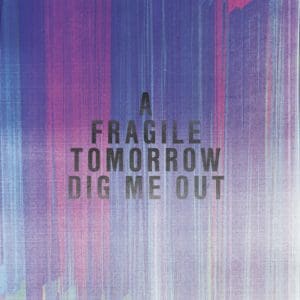The members of A Fragile Tomorrow have accomplished more as a band before any of their 30th birthdays than most bands achieve in a lifetime. Brothers Sean, Dom, and Brendan Kelly formed A Fragile Tomorrow in Montgomery, New York in 2003 when everyone was still a teenager. A few years later, bassist Shaun Rhodes joined the mix and the band relocated to Charleston, South Carolina after falling in love with the town while on tour. Before long, the quartet began touring with legendary acts like the Indigo Girls, the Bangles, and Toad the Wet Sprocket, then started collaborating with renowned artists like Joan Baez, Mark Hart of Crowded House, and iconic REM producer Mitch Easter. They once even opened for the Pope.
In only 15 years, they managed to release five studio albums, two EPs, and a live record. But with the world beginning to drastically change around them and tragedy striking their family, they all realized they were coming to a crossroads. Would the Kelly Brothers keep A Fragile Tomorrow alive with Brendan in Charleston, Sean in Savannah, and Dom leaving Atlanta behind for Los Angeles? Do people still care about power pop music?
After much discussion, the answer seemed obvious: of course they’d keep the band together. They needed to, if only for themselves. Sean recognized the band was long overdue for a poignant reinvention, so Dom shifted from drums to keyboards, and Brendan found himself more involved in the songwriting process. This fall, they’ll be releasing their yet-to-be-titled new record, and it’s their most political one yet.
We sat down with the three Kelly Brothers in a rented out house in West Hollywood to hear more about how they approached that reinvention. Read below to hear how the brothers claim that moving out and moving on actually helped their songwriting, how both the death of their late mother and Donald Trump inspired elements of the new record, and catch the exclusive world premiere of their music video for their newest single, “Dig Me Out.”
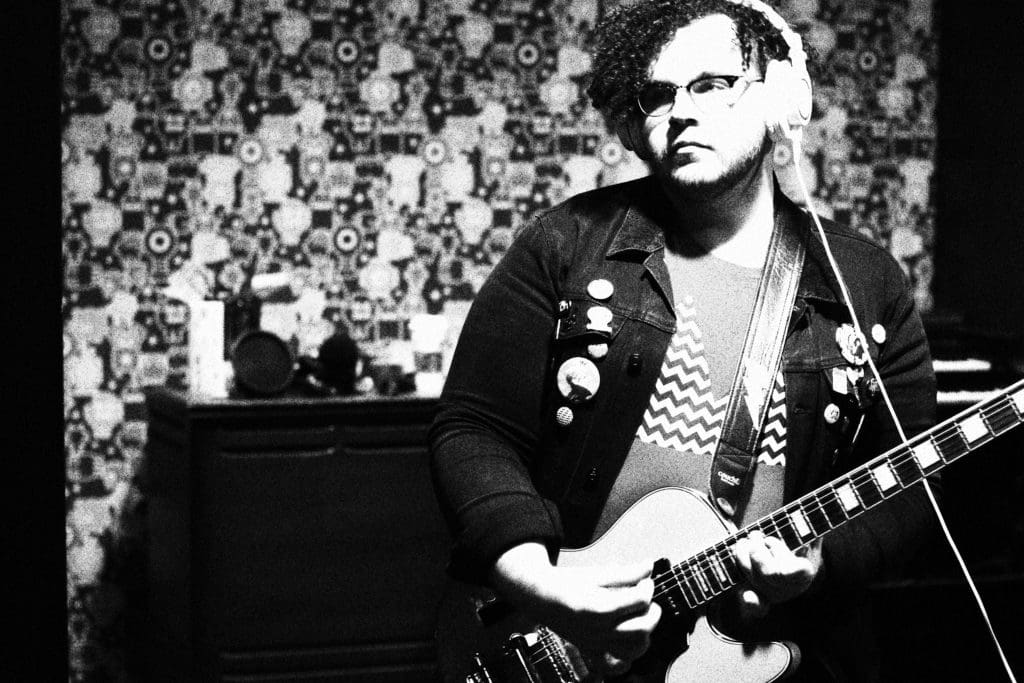
I listened to you guys a bunch this weekend and it was so fun doing a deep dive into the history of A Fragile Tomorrow. You guys have such a garage-band type intimacy and a melodically rich quality of songwriting. So, I’m curious, since you all started out in New York and some of you have moved down south and now Dom is in LA — how do you feel geography has affected A Fragile Tomorrow and your songwriting in general?
Sean: I think it’s probably been the biggest factor in terms of evolving the band. From a logistical standpoint, especially Dom moving to LA, it made us think about how to do the band. And that’s why he moved to keyboards. It made sense to have a drummer who’s nearby the rest of us, so it’s easier to rehearse. And [Dom] became more interested in keyboards, too.
Dom: But also we grew up listening to music from the South and North Carolina music scene. When Sean was 4 years old he was like, “I’m gonna move to South Carolina and go to USC and be Hootie and the Blowfish.” (laughs) Which didn’t happen, but we did move to Charleston. We went down there on tour and fell in love with the music scene. All those North and South Carolina bands were a big influence on us.
Sean: Like musically, we’ve kind of evolved passed them. Not really past them but we’ve gone in a different direction, I think. But I do think, it’s weird because the new record is very Krautrock and very specific to Germany and a certain time period. And then some of the hip hop influences are specific to late 80s, early 90’s Queens hip hop. So there’s a weird geographic thing happening. I’m very interested scenes. That always kinda plays a role.
But being in separate cities has breathed life into the whole thing. There’s something about Dom being in LA that I can’t describe. Just recording his stuff here in LA was exciting. It was a change of scenery from our studio in Savannah. I think it’s played a big role and helped shape where the band’s gone. As opposed to, if we were all in one place, you’re not experiencing as much diversity I think.
In a weird way, it allows for a fresh perspective, because it’s not all you guys sitting in one room maybe doing things you’ve already done in the past.
Sean: Exactly. It forces us to schedules things, too. We really have to be aware of time, which I think is the best thing to ever happen to us. I’m not one for doing things spontaneously and doing pop-up shows. I like to have things planned with this band.
You briefly mentioned a couple of influences, which reminds me that you’ve all worked with and toured some true music legends — specifically Joan Baez, the Indigo Girls, the Bangles, Mark Hart of Crowded House. Can you speak to how these artists have directly influenced your guys’ music, or how they’ve influenced you as musicians? And if there’s anyone you haven’t worked with yet, who you’d like to?
Sean: Touring with Indigo Girls — we were big fans of all those people growing up. Those early Bangles records were great. We were fans growing up definitely, but the biggest influence I think – we were just talking about this last week with someone in Savannah – going on tour with those bands teaches you how to tour and be in a band. And do things on a level above DIY.
Brendan: Those tours with Indigo Girls — we were only 15 and 17. Those were huge learning experiences for sure. And the Indigo Girls, they’re the type of band to take openers under their wing. There’s younger bands out there and we got that experience from them. They showed us the ropes of touring and like existing in a professional environment. That was cool.
Dom: And people we haven’t worked with? Everyone. I want to work with everyone.
Sean: There’s a band called Deerhoof, they’re mainly based in Brooklyn, and they’re just insane and incredible and inventive. I’d love to tour with them one day and work with their drummer. He’s one of the greatest drummers in modern history.
Dom: Brendan turned me onto the Dirty Projectors. I really love that band. They’d be fun to work with.
Sean: We were just talking about how, personally my taste in music right now is – I’m really interested in people who reinvent themselves every album and evolve their sound. That’s where my ear is going right now. And there’s a lot of different people doing that right now. Neil Young basically does that every record. He does crazy shit probably at the behest of his record label. I like the idea of working with people who are just in it to experiment.
Dom: Elvis Costello too.
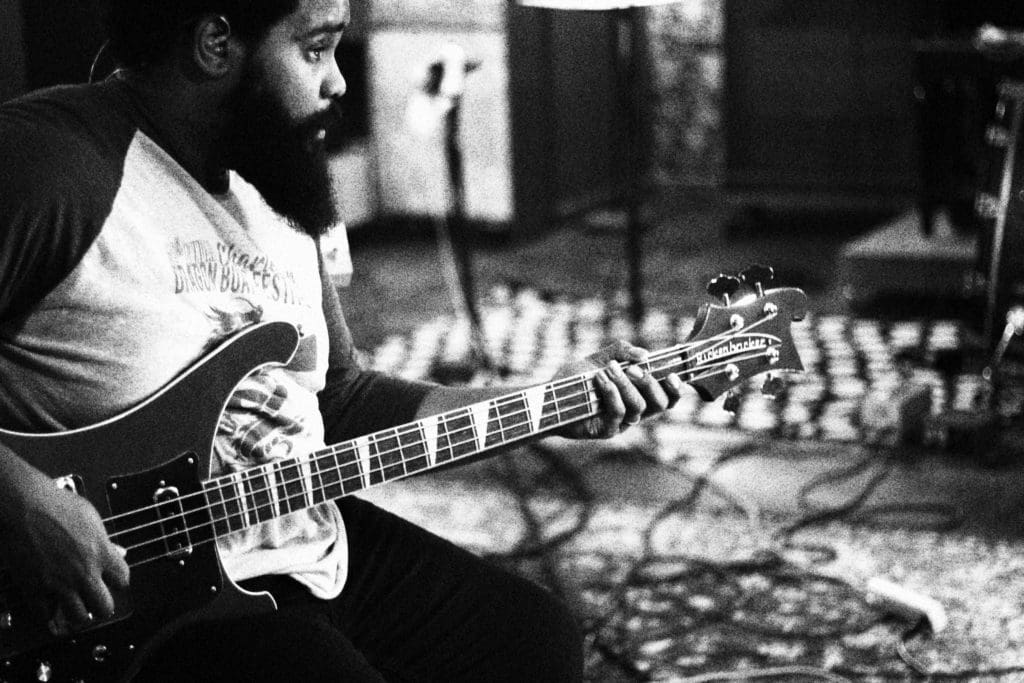
It’s funny you used the word “reinvention” because that was just in my next question. I was reading about how Sean recently spoke to PopDose about “Dig Me Out,” your guys newest single, which might be one of my favorite things you’ve ever done. You specifically told them that you felt like the song marked a “reinvention of sorts” for the band. Can you elaborate what you mean by that?
Sean: We always try to evolve, but this was the biggest — like, let’s scratch it all and reimagine everything about this band. It was totally intentional too. I mean, the songwriting kind of happened naturally, but changing things completely was intentional. And it had a lot to do with Dom moving to keyboards, ‘cause it was like, we needed to figure out how to incorporate synths not as background but a main instrument. I think after our last record, we realized we were getting a little boxed in stylistically .
Dom: This powerpop world that we’ve kind of been in for so long is – all of our favorite bands are in that world. But it can be limiting especially for people our age. Most people our age don’t even know what power pop is. I think we felt that our taste was changing, but we kind of wanted to be accessible. Does that make sense?
Sean: I think accessible, yes, but also we wanted to be– not more avant garde but more experimental in the way we do things. And then challenge ourselves and get uncomfortable with what we’re playing and not feel so comfortable in just chord-based guitar stuff.
Dom: But like you said in that interview, the core of what we’re doing is still pop songs. It’s still all harmony driven.
Sean: I don’t think there’s any way it won’t be that to some degree. I’d like to go further in pushing the envelope sonically, but, at the core, it’ll always be a certain thing. How we can do it, but in a different way aesthetically and try to pull from different influences. We weren’t listening to the same kind of stuff when we were younger. We wanted to not do what was obvious.
Brendan: We kind of set loose guidelines during the production, like no acoustic guitars, no Hammond organ. If something seems like the obvious choice, let’s try something else to fill those shoes. That led to interesting results. With synths, instead of doing whatever, we thought, let’s zoom in on a specific sound for Dom.
Sean: We talked about it over and over. I wanted guitars to sound not like guitars and more like synths as much as possible. We liked a lot of effects. It was strategic.
Dom: We’re also just different people now. Our lives have changed dramatically since our last record. We kinda had [to change]. And I think also, we had an existential crisis as a band, or at least I did. With our mom dying, we asked ourselves, what do we want to do? We’ve been doing this for so long.
Sean: 15 years.
Dom: For 15 years, this has been our identify for so long – do we want to keep doing it? It was clear while we were writing. Yeah, we want to do this, but do it differently than what we’ve done in the past.
Sean: It felt new. It didn’t feel like just another album cycle. Bringing in a new drummer brought that in. I remember before we even started the record saying to you guys, “I can’t picture what another AFT record sounds like.” And the reason I couldn’t was because I was thinking of the next thing instead of, “what’s a new band going to sound like with the same people?”
Dom: We almost changed our band name. We spent a couple of months thinking about it.
Sean: We really thought just about really starting over. We’ve been attached to it for so long. But we had a deep touring history. We wanted to rebrand, but we thought changing the sound was enough.
I keep going back to the word “psychedelic” when I think of “Dig Me Out.” It’s definitely more synthy and feels like it has a groovy, psychedelic vibe to it. It honestly reminded me a lot of your solo work, Sean – especially your song “Syncopation.” Do you feel like working on solo material has influenced this new record, and do you look at them separately, or see it as approaching the same thing?
Sean: It’s starting to feel like they’re one thing. It’s weird because Brendan [produced] my solo record too, but I played everything myself. It was very intentional. Actually our current drummer Josh played on my solo record a bit too. The bleed is kind of weird — we were making my solo record and we’d finish working on a song, so we’d just sit around and start writing. Brendan and I wrote a lot of the songs together for this new one. In the past, I’d write most of it, but now we collaborated more after we’d finish things up with my solo record. So it was all happening at the same time.
And our bass player Shaun was listening to my solo stuff and noticing that it was a little bit more groove-oriented and 80’s, and he said, “It would be cool if we made a dance record for [AFT].” Hearing my solo stuff made him think that. I don’t think the band would sound as it does now without the solo project. And Dom’s [solo album] too. It happened at a time when we were questioning a lot. We hadn’t stopped doing the band for 13 years and we all needed to step away. Which helped get him into keyboards. And excite ourselves more, and not release just another album in the cycle.
Dom: My [album] probably didn’t influence us stylistically, though.
Sean: Sure not stylistically, but we were carving out our own identities. And also Brendan and I were producing a lot more at that time. We’d sample things for other bands and it would give us cool ideas to try out for AFT. Things we were doing while we were taking a break ended up influencing us a ton.
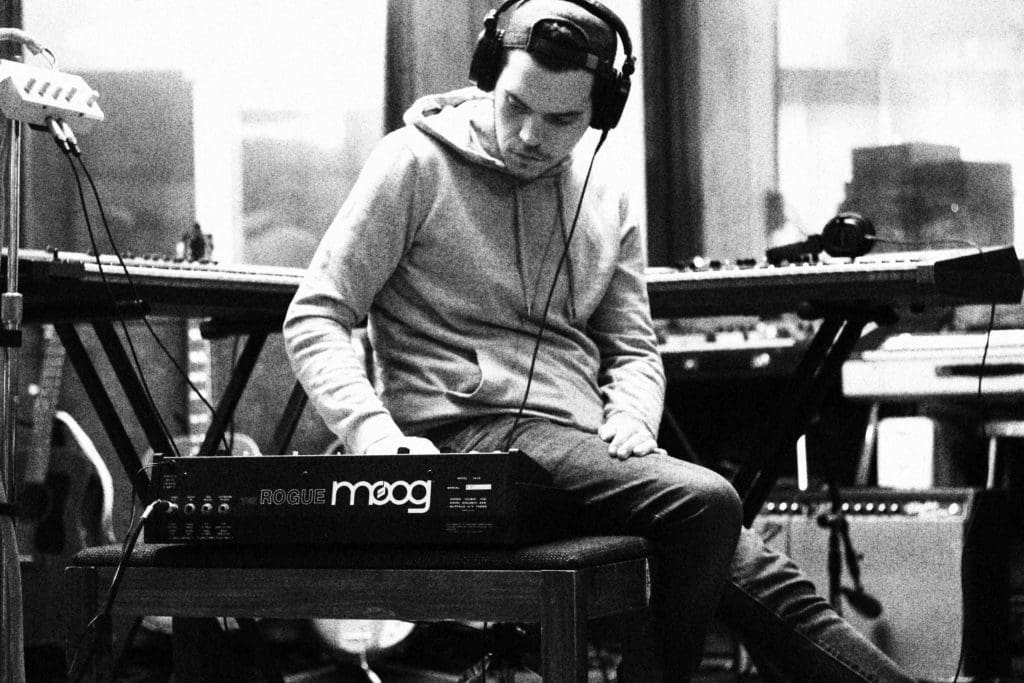
I was going to say about your solo record, Dom, it seems more measured and emotional than most A Fragile Tomorrow work. Was that approach intentional, or simply natural as a songwriter?
Dom: It’s just natural. To be honest, my songwriting has always been collaborating. I’ve never written a song on my own for the band. I guess I did, but a long time ago before we were an actual band. I’ve always wanted to do a solo record, but I was afraid to. I compare myself a lot to Sean and I think he’s a genius, so I always felt very insecure. But I went through a breakup, a bad one. I was doing a lot of trying to figure out what was next. And I just woke up one day and asked Brendan, “We have this whole week of doing nothing — do you want to go into the studio with me?” So we just went into the studio and it just happened. I’m folky at heart. The singer songwriter direction – no one was surprised that was the record I made ‘cause that’s me. We’d be on tour, long rides in the middle of the night and Brendan needed hardcore punk to keep him awake and I’m listening to Joni Mitchell’s Blue on repeat and weeping. (laughs) That’s me.
Sean: I do think your record was singer songwriter-y, but still aesthetically you.
Dom: Yeah and there’s so much AFT on there too. I went in thinking this will be singer songwriter-y and stripped down, then it sort of evolved. I actually wanted to do a record of duets — that was the original intent. And there are a number of them on there. It was an intentional style, but evolved into something. It was really a bucket list thing, honestly.
So I think because of your guys’ influences – namely I hear the Beach Boys in your harmonies, and Cheap Trick and Violent Femmes in the orchestration – you guys have this timeless rock quality about you. So I wonder if the outside world of 2018, or things that are happening politically have ever permeated your music, or do you purposely keep them separate? Sean’s solo record seemed more political that AFT, so will you be embracing that more in the future?
Brendan: This [new] record is definitely political.
Dom: It’s such a political record. When we were young, our parents were always like, “Don’t sing about politics,” because we were young and they were like “momager” and “dadager” for a long time. But also they thought we might alienate people who don’t agree with us, which I understand. But with everything going on – my solo record was very political. It was obvious that we had to do that too.
Sean: We definitely had to. I specifically remember one thing. We have some family in Charleston, and we immediately got into an argument about police brutality at dinner. My wife and I were sitting at the table and I was not indulging in the conversation at all. And my mom and Kennedy [my wife] were asking me to speak up, but I was too tired. Later on, my mom came and talked to me and said, “I’m disappointed that you didn’t make your voice heard” even though she had a different opinion than me on that particular subject. And that always stuck with me. As we got older, she was encouraging of us to speak our mind politically and I think when she died, I definitely had a moment where it clicked – I don’t really give a fuck anymore. You can’t make everyone happy, and if you alienate people who don’t want to listen to you because of what you’re singing about, that’s their prerogative. I can’t write songs about unrequited love – I mean I’m married, I can’t write those songs anymore.
Dom: The majority of Sean’s songs were about unrequited love for about 15 years. (laughs)
Sean: At some point, you have to dig a little deeper. After Mom’s passing, it made us all realize we have to go for it. The songs are pretty political. There’s a song called “Gun Shy” on the record that’s a bit controversial. The first line of the song is “White man, look into the mirror” — that was a little hard for me to write. That was the first one where I went, okay screw it, I’m in. I can’t really stop. It just snowballed. I really wanted to write about money and politics and social injustices. “Dig Me Out” is about, you know, the political system being set up against us as people. The rich keep getting richer and put you down. To me, it doesn’t matter, Democrat or Republican, if you’re a corporate politician, you’re working for your donors. But we need to lift each other up and have marches and put pressure on politicians, that’s the way to make change in this country.
Dom: I think we were all sort of thinking — maybe our mom started thinking it first — what’s this world I’m leaving for my kids and my family? That became the theme of the album. Like dying in Trump’s America. It starts out very political, then goes into all these songs about Mom and death.
Sean: They were about Mom, but one thing we didn’t want to do was “I’m sad, I miss my mom” stuff. It didn’t seem productive. Everyone can assume that we miss our mother and we loved her and all that stuff. But I wanted to write about how, later on in her life, when she was in so much pain, she literally said the words, “They’d put a dog down for a lot less than this.” It got me thinking. To not allow someone to not have the option to end their life on their terms for any reason – religious or otherwise is–
Dom: It’s inhumane.
Sean: It’s inhumane. So that’s how a lot of the songs about Mom came about, advocating that sort of thing. It wasn’t our experience with her passing or writing a “rest in peace” kind of song. I wanted it to be actually impactful. They’re still political that way. It’s activism. I think I’m only going to get more political.
Dom: And our friends inspire us to do that. The Indigo Girls probably identify as activists before musicians. Joan Baez is the same way.
Sean: It’s using art for a purpose.
Dom: Nothing fucking frustrates me more than when people are like, “Just play music. Just shut up and sing.” Fuck you.
Sean: I said that last night in Savannah. I said, there’s no better way to get someone to write about politics than tell them to shut up and sing. That’s not what art is. It’s about expression. We’re all citizens and human beings.
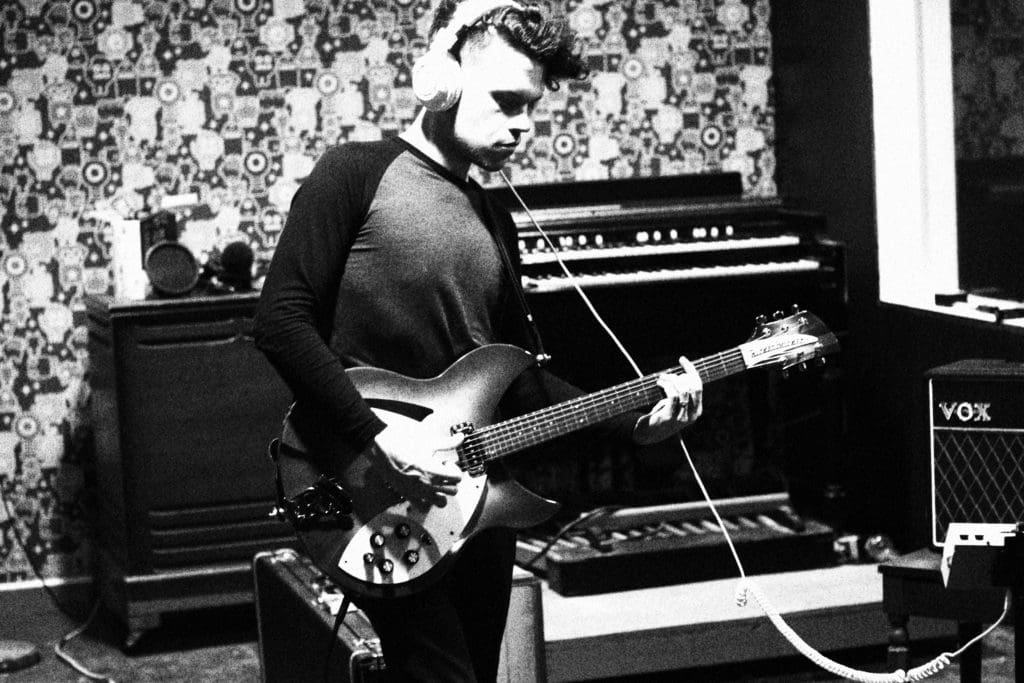
So many great musicians throughout history have all been political in some form. I mean, it worked for Green Day.
Sean: It really did. It really does enact change. Art that encourages speech and action is what pushes things forward. Being a small part of that is important. Brendan and I made a hardcore punk project a few years ago and we sent it to a friend who wrote all these Trump-related lyrics. It was fulfilling to be involved in something outspoken.
My last question, to shift gears a little bit: you guys have a music video for “Dig Me Out” that we’ll release with this interview. It seems like you guys have a lot of fun with your videos, as you have in the past with “Make Me Over” and “Kernersville,” which is truly a gem existing on the internet. So, can you tell me a bit about the “Dig Me Out” video and what it was like shooting that?
Sean: Sure, it happened in two different places and segments.
Dom: Half in New York and half in Kernersville, North Carolina.
Sean: It’s the most collaborative thing we’ve ever done. Brendan’s girlfriend is a long-time friend of ours who’s worked with the band and stuff. She is a theatre teacher and actor and shot all the narrative stuff in New York and we shot the band footage in North Carolina. It’s kind of political in it’s own way under the guise of–
Dom: It’s like a Black Mirror episode.
Sean: The message underneath is about control.
Brendan: It goes with the theme of the song. Sort of like the character in the video is trying to break free from things holding her back and is trying to, at the end – she warns people to get free. It’s like a dystopian near-future.
Sean: The idea was to – we didn’t have much of a budget – so the message was to get it across a simple as possible without special effects. I’m really proud of it.
Dom: The cool part about it is that we worked with our friends. It wasn’t just some dude that the label suggested.
Sean: Literally our two co-producers on the album were there during mixing when we filmed all the band footage. So they were involved in filming and having creative input. Our friend Max who did the “Make Me Over” video edited this video. We grew up with him and would make movies with him when we were 7 years old, so it feels like family. It was nice to have everything be in-house. We could really execute our vision.
So when and where can people get the new record?
Brendan: It’ll probably be out in the fall.
Dom: We don’t have a date yet, but probably October or November.
This interview has been condensed and edited for clarity.


